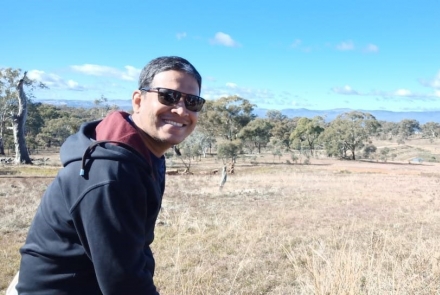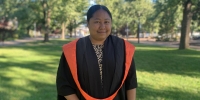
Fighting for the future of Bangladesh
Master of Climate Change graduate Md Kabir Hossain has come a long way, fighting through personal challenges, and for his country to develop better solutions to the pervasive policy issues brought about by climate change.
Due to its geographical location, Crawford graduate Kabir Hossain’s home country Bangladesh is on the frontline of the fight against climate change - particularly in its coastal regions.
Out of his concern for his country, Kabir decided to learn more about climate change and how to make policy that would truly help mitigate its impacts.
Home to some of the leading experts in the field of climate and environmental policy, Crawford was an obvious choice for him.
“If it continues like this, Bangladesh will face huge issues in the future,” he said.
“Our government has launched the Bangladesh Delta Plan 2100. We’re trying to save this land, and this is why we need resources - human resources. I was hoping that with this qualification I’d be able to provide expertise, and pay back to my country.
“As a civil servant I found that it was time to learn something so that I can help develop climate change responses.
“I found that Crawford School is one of the best schools in the world for public policy and climate change, having outstanding experts such as Professor Frank Jotzo and Professor Bob Costanza teaching at the School. Crawford scholars have authentic scientific knowledge, which makes the School such an excellent place to study.”
In 2018, the Bangladesh government gave Kabir the opportunity to visit Australia for a short course. He said that he fell in love with the country and decided that wanted to come and study here longer-term.
“I applied for the Australia Awards scholarship - it’s a unique scholarship for people from developing countries. When I got it, I felt on top of the world and everyone had great expectations for me.”
Looking back, Kabir wished that he could’ve taken many more courses at Crawford School, but unfortunately, he only needed 16 to complete his degree.
Kabir said he would have a hard time choosing his favourite as he enjoyed the insights and specific focus each class had to offer.
“I loved Associate Professor John McCarthy’s ‘State, Society and Natural Resources’ class and Professor Luca Tacconi’s ‘Environmental Governance’ course. I think I will read his research over and over again.
“During my degree I also took Professor Jamie Pittock’s ‘Climate Change Vulnerability and Adaptation’. This course really represented what is going on in Bangladesh. There are so many adaptation attempts happening in the country. Due to the strong resilience of our community, most of them work out well, but some of them have created many challenges for us. It was an eye-opener for me.
“I also enjoyed ‘Gender in Resource and Environmental Management’ by Professor Kuntala Lahiri Dutt, which helped me understand the need of inclusion and recognition of women in natural resource management.”
For Kabir, studying at Crawford was all about building confidence in his research and negotiation skills, and that Crawford’s academic skills advisors assisted him to overcome his academic gaps.
“Professor Frank Jotzo’s ‘International Climate Change Economics’ course gave me a lot of confidence as a civil servant to uplift our country and point towards the need to prevent the worst impacts of climate change. I learnt how to negotiate in this course, and how to open up the issues that Bangladesh is facing.
“When I started at Crawford, I knew very little about how to research. But within the first few months, many of the lecturers at Crawford gave me great advice to overcome this challenge. Dr Bec Colvin and Dr Keith Barney taught me the basics in ‘Research Methods for Environmental Management’ course. I realised that without good research, I wouldn’t be able to write anything that people would believe in.”
Before he joined the Bangladesh public service, Kabir was an English lecturer.
Now back in the country, Kabir has taken up the role of Senior Assistant Secretary having recently completed nine years of service for the government.
“I taught in private and government institutions across Bangladesh for about four years. But then I joined the public service, because I wanted to work with policymakers. When you’re in the field you’re just following the policies of the government, but when you’re on the ministerial level you have the chance to work with parliamentarians. If you do your best, you can become a change-maker.
“I just came back to Bangladesh and I already got a posting as Upazila Nirbahi Officer (UNO) - I’m responsible to the central government as the administrative head and chief coordinator of a subdistrict (Upazila). Maintaining law and order, implementing policies taken by all ministries and departments and providing feedback are some of my main working areas.
“As a CEO of 17 different departments of Upazila Parishad (local government) I work closely with the local community, elected representatives, NGOs, and political leaders to ensure and monitor the development necessities and emergency needs. Bangladesh has limited resources, and we need to make sure that everyone gets assistance from the government.”
Towards the end of 2020, amidst great personal loss due to COVID-19, Kabir finished his degree.
He said that the support that he got from his lecturers and his friends at Crawford gave him the strength to persevere and complete his studies.
“When COVID-19 hit Bangladesh, like many of us, I lost a family member and my parents got very sick. I had my spouse with me here, but it was so hard.
“Everyone was really supportive… I have so many friends at Crawford from all over the world who supported me.”
“I’m also extremely grateful to Dr Sarah Milne, who was always there to answer my questions. She guided me like a true leader which made me confident that I could finish my degree. Everyone is there to help you at Crawford.”
Updated: 27 July 2024/Responsible Officer: Crawford Engagement/Page Contact: CAP Web Team












